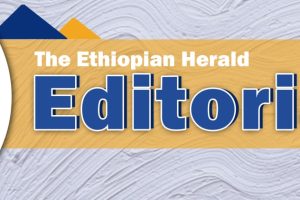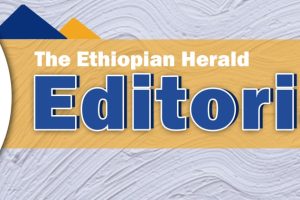
The Ethiopian Army as always in the past and in the future will continue to play a pivotal role in the nation building and for that it must emerge as a national symbol and represent the nation’s unique characteristic which is ‘Unity in Diversity’.
The military virtues of sacrifice, loyalty and discipline have always remained and must serve as objects of veneration for the rest of the nation. The Army has always remained the corner stone of Nation Building and the armed forces have proved to be amongst the most important national institutions ensuring security of the nation so that we could transform our country into a democratic and plural society.
The Ethiopian Defense Force has been a firm believer that it will continue to play a pivotal role towards Nation building and today the Ethiopian Defense Force holds the same belief of its continued relevance as Ethiopia shapes its destiny as it increasingly gains greater stature in the comity of the Ethiopian Nations, Nationalities and Peoples.
Firstly, what does Nation Building imply? Originally, nation-building referred to the efforts of newly-independent nations, notably the nations of Asia and Africa, to reshape territories that had been carved out by colonial powers or Empires without regard to ethnic, religious, or other boundaries. These reformed states later on became viable and coherent national entities because of their nation building efforts aimed at establishing a national identity for themselves. Ethiopia is swiftly changing and the changes are for the good of the country and its peoples as a nation.
The country is still undertaking various institutional reform measures for better outcomes and to the satisfaction of its peoples. Responding to the demands of the public, major reforms underway across the board include democracy, security and justice sectors. As part of the reforms, the country is still in various activities of reshuffling, restructuring and amending legislations, and so on. Appointment of officials is also another area the reforms are addressing. For instance, by now half of the ministerial posts in the government have been taken by women. Experts of various fields, regardless of party affiliations, have currently been working in government and/or appointed to different committees.
When we come to the area of diplomacy, after ending the state of war Ethiopia had with Eritrea for almost two decades, Ethiopia has initiated other diplomatic moves that are now bearing fruits in the Horn of Africa and beyond. As part of institutional reform measures, the country is also in the process of reforming the way it should handle diplomatic relations with the rest of the world. In this regard, the Ministry of Foreign Affairs has completed its organizational reform measures so as to fit itself to the present demands of the country in the diplomatic area. As a major departure to the government’s old practice, the ministry is striving towards new goal-oriented operating system. The other change, that can be described as a fundamental one is related to the appointments of Ethiopian diplomats abroad.
As per the change, new deployments of ambassadors or other diplomats will rely on professionalism and diplomatic skill. Likewise, the responsibility assigned to them will also be equally changed and solely be to promote Ethiopia’s interests.
The two fundamental changes can be considered as a major departure from the old practice. Because, until now, what the government used to appoint to diplomatic positions were mainly incompetent people for the job. In fact, as a basic norm, the ruling party and the government used to employ diplomatic appointments as system of isolating their interparty critics or favoring old guards to enjoy leisure times and money abroad, though the party and the government structures were fully aware of the fact that nation gets little or no results from them. We can even recall the incalculable damages made by the kind of persons particularly in view of the big wedge that had created between Ethiopia and its beloved sons and daughters in the Diaspora.
Those ugly pasts will shortly be over as the country has now opted for merit-based diplomacy. The peoples to be appointed on diplomatic missions from now on wards would be highly qualified. As a departure also, they will not be required other than serving their nation. Thus, ambassadors and diplomats appointed from now on wards should not compromise the national interest at the expense of political partisanship, like in the past. They should be very clear that their appointments were necessitated after all by the pressing demands for fostering peace, democracy and development; ensuring and promoting citizens’ rights, interests and prestige abroad; and improving consular services they render for citizens and foreign nationals.
The new appointments, in short, will be expected to facilitate Ethiopia’s leap forward for better political, economic and social future. Career diplomats for the nation’s best Future Nation building and security Part I This was needed to be deliberately constructed by molding different ethnic groups into a nation, especially since in many newly established states colonial practices of divide and rule had resulted in ethnically heterogeneous populations. Today in a globalized and interdependent world Nation-building has become even more relevant.
Nation states are political units in an international system and they represent the citizens aspiration to be grouped in a single political unit that would in turn act as an instrument to achieve life, liberty and pursuit of happiness. Therefore, the process of Nation Building by any nation aims at the unification of the people within the state so that it remains politically stable and viable in the long run. The 21st century looks towards security, justice, economic development and a democratic polity as the pillars of nation building. Security comes first in the pecking order because the other three pillars function effectively only if the security threshold on the nation, both internal and external, remains intact.
This in turn facilitates smooth functioning of democracy and brings in its wake social justice and economic development. Unfortunately, in states where the roots of democracy are not firmly embedded, security becomes a victim of inefficient, parochial and dithering attitudes that form the essence of the difficult business that defines democracy. In Ethiopia, democracy, however, tenuous, has managed to hold and the constitution as initially introduced continues to be sacrosanct.
This has been facilitated, by no small measure, by the armed forces who have maintained, most scrupulously, the ideals enshrined in the constitution and have made a great contribution towards nourishment of democracy in the nation.
The strength of the armed forces lies in their high standards of discipline and morale supported by a secular outlook and an apolitical demeanor. They have, in the highest spirit of nationalism, stepped forward to face all challenges posed to the nation and have been a pillar of support to the people who look up to them in times of crisis.
The capability of the nation to maintain its most significant pillar of security, has contributed significantly to the progress that it has recorded. Economic interdependence among Ethiopia’s varied states has undoubtedly made considerable progress and can surely be cited as contemporary Ethiopia’s prime achievement.
This has also brought in its wake economic integration and is, therefore, one of the enduring foundations of Ethiopia as a state. How strong then is the Ethiopia’s nation state today? Undoubtedly, Ethiopia’s progress has been considerable. Politically, the nation has demonstrated that it is a stable and indeed a vibrant parliamentary democracy. Economically, we are amongst the fastest growing nation in the world. Cultural integration has made progress and is definitely oriented in a positive direction.
Social integration is, nevertheless, still a distant goal and its conflicts manifested in religious fundamentalism and the evergrowing gap between the `haves’ and the `have-nots’ is certainly a cause for concern. However, when viewed in the historical perspective and the global context, the problems, deficiencies and inadequacies are transient and inherent to the stage of development that Ethiopia is passing through.
The Armed Forces with their ingrained spirit of Nationhood can certainly play a significant role in fostering the spirit of ‘inclusive growth’ as enunciated by Government. Ethiopia inherited a battle experienced and an apolitical force. It played a commendable role during the horrendous communal violence. It was also immediately involved in defending the nation from external aggression. The army has also been involved extensively in internal security duties including fighting insurgencies.
The military has also always played an intensive role in human assistance and disaster relief in various parts of the nation in the direst of circumstances and at all times. In Ethiopia, though the military forces are a substantially big institution, it has so far played no role as an institutional power group in the country’s politics.
The military forces have in fact steadfastly remained loyal to the elected government and been its obedient servant. In comparison to other developing countries, it can now be very safely concluded that it is because of this nonrole in politics by the military forces of Ethiopia that the nation has been able to establish and maintain its democratic foundations. This non-role in governance has helped the Ethiopian military to achieve a high degree of professionalism and concentrate its efforts on readying itself for its main task of defense of the country.
The military however plays its traditional role for rendering advice on matters concerning national security. The Ethiopian military has always devoted itself to being able to successfully carry out any of the roles that the elected government has allotted to it. The prime and major role is clear-defend the nation against its potential enemies.
This per se is not a nation building function but it is the absolute pre-requisite for nation building. To fulfill this primary role, the requirement is that the armed forces are in readiness to defend the nation at all times. In a rapidly changing security matrix this role of the Armed Forces needs to be further strengthened.
The Armed Forces have been a symbol of unity and secularism through turbulent times faced by the country and has fostered the spirit of One-Ethiopia, like no other organ of the state. Be it the sectarian clashes, terrorism or insurgency, the Armed Forces in general and the Army in particular have maintained their ethos; an ethos that has proved to be a strong fabric for National Integration
Herald December 21/2018
BY YOHANNES GEBRESELLASIE (Ph.d)





